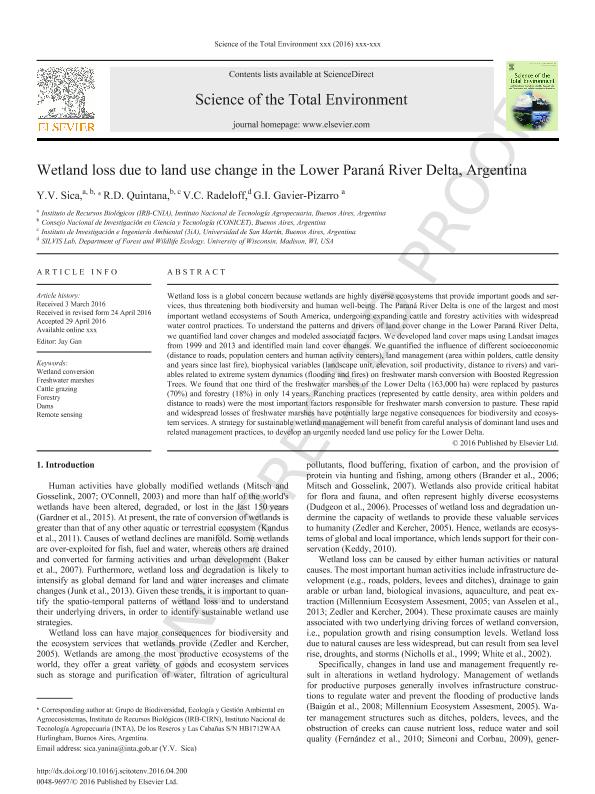Mostrar el registro sencillo del ítem
dc.contributor.author
Sica, Yanina Vanesa

dc.contributor.author
Quintana, Ruben Dario

dc.contributor.author
Radeloff, Volker

dc.contributor.author
Gavier Pizarro, Gregorio

dc.date.available
2018-05-03T17:09:14Z
dc.date.issued
2016-10
dc.identifier.citation
Sica, Yanina Vanesa; Quintana, Ruben Dario; Radeloff, Volker; Gavier Pizarro, Gregorio; Wetland loss due to land use change in the Lower Paraná River Delta, Argentina; Elsevier Science; The Science Of Total Environment; 568; 10-2016; 967-978
dc.identifier.issn
0048-9697
dc.identifier.uri
http://hdl.handle.net/11336/43970
dc.description.abstract
Wetland loss is a global concern because wetlands are highly diverse ecosystems that provide important goods and services, thus threatening both biodiversity and human well-being. The Paraná River Delta is one of the largest and most important wetland ecosystems of South America, undergoing expanding cattle and forestry activities with widespread water control practices. To understand the patterns and drivers of land cover change in the Lower Paraná River Delta, we quantified land cover changes and modeled associated factors. We developed land cover maps using Landsat images from 1999 and 2013 and identified main land cover changes. We quantified the influence of different socioeconomic (distance to roads, population centers and human activity centers), land management (area within polders, cattle density and years since last fire), biophysical variables (landscape unit, elevation, soil productivity, distance to rivers) and variables related to extreme system dynamics (flooding and fires) on freshwater marsh conversion with Boosted Regression Trees. We found that one third of the freshwater marshes of the Lower Delta (163,000 ha) were replaced by pastures (70%) and forestry (18%) in only 14 years. Ranching practices (represented by cattle density, area within polders and distance to roads) were the most important factors responsible for freshwater marsh conversion to pasture. These rapid and widespread losses of freshwater marshes have potentially large negative consequences for biodiversity and ecosystem services. A strategy for sustainable wetland management will benefit from careful analysis of dominant land uses and related management practices, to develop an urgently needed land use policy for the Lower Delta.
dc.format
application/pdf
dc.language.iso
eng
dc.publisher
Elsevier Science

dc.rights
info:eu-repo/semantics/openAccess
dc.rights.uri
https://creativecommons.org/licenses/by-nc-sa/2.5/ar/
dc.subject
Wetland Conversion
dc.subject
Freshwater Marshes
dc.subject
Cattle Grazing
dc.subject
Forestry
dc.subject
Dams
dc.subject
Remote Sensing
dc.subject.classification
Otras Ciencias Biológicas

dc.subject.classification
Ciencias Biológicas

dc.subject.classification
CIENCIAS NATURALES Y EXACTAS

dc.title
Wetland loss due to land use change in the Lower Paraná River Delta, Argentina
dc.type
info:eu-repo/semantics/article
dc.type
info:ar-repo/semantics/artículo
dc.type
info:eu-repo/semantics/publishedVersion
dc.date.updated
2018-05-03T13:57:31Z
dc.journal.volume
568
dc.journal.pagination
967-978
dc.journal.pais
Países Bajos

dc.journal.ciudad
Amsterdam
dc.description.fil
Fil: Sica, Yanina Vanesa. Consejo Nacional de Investigaciones Científicas y Técnicas; Argentina. Instituto Nacional de Tecnología Agropecuaria. Centro de Investigación de Recursos Naturales. Instituto de Recursos Biológicos; Argentina
dc.description.fil
Fil: Quintana, Ruben Dario. Consejo Nacional de Investigaciones Científicas y Técnicas; Argentina. Universidad Nacional de San Martín; Argentina
dc.description.fil
Fil: Radeloff, Volker. University of Wisconsin; Estados Unidos
dc.description.fil
Fil: Gavier Pizarro, Gregorio. Instituto Nacional de Tecnología Agropecuaria. Centro de Investigación de Recursos Naturales. Instituto de Recursos Biológicos; Argentina
dc.journal.title
The Science Of Total Environment

dc.relation.alternativeid
info:eu-repo/semantics/altIdentifier/doi/http://dx.doi.org/10.1016/j.scitotenv.2016.04.200
dc.relation.alternativeid
info:eu-repo/semantics/altIdentifier/url/https://www.sciencedirect.com/science/article/pii/S0048969716308993
Archivos asociados
